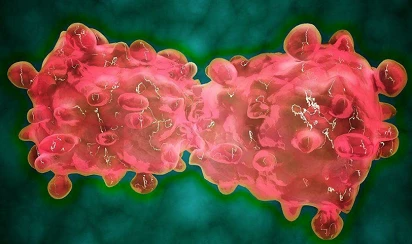The study found that NOTCH-1 signaling pathway can hijack the heat shock transcription factor 1 signaling pathway

The study found that NOTCH-1 signaling pathway can hijack the heat shock transcription factor 1 signaling pathway

Copyright © iCell Bioscience Inc, Shanghai 2018-2019
Recently, scientists at New York University School of Medicine found that the NOTCH-1 signaling pathway can hijack the heat shock transcription factor 1 (HSF1) signaling pathway in T-cell acute lymphoblastic leukemia (T-ALL), predicting blockade of the HSF1 signaling pathway. One or more genes may be a new way to treat this malignant disease. This is the first time that activation of the HSF1 signaling pathway has been directly associated with a leukemia.

NOTCH-1 plays a key role in T cell development. 50% of T-ALL patients have a point mutation in the NOTCH1 gene, and overexpression of NOTCH1 in mouse hematopoietic cells may trigger T-ALL. Under stress-free conditions, both Hsp70 and Hsp90 were shown to be inhibitors of HSF1, which interact with HSF1 to retain it in the cytoplasm. Under stress stimulation, Hsp70 and Hsp90 interact with unfolded proteins, releasing HSF1 monomer into the nucleus and further activating HSF1 transcription.
Transcriptional activation of HSF1 strongly induces molecular chaperone gene expression, and molecular chaperones play a role in remediating protein misfolding and rebuilding cellular homeostasis. Once misfolded and damaged proteins are refolded or degraded, Hsp70 and Hsp90 interact with HSF1 in the cytosol, inhibiting its activation and restoring the basal transcriptional level of the chaperone gene.
In cancers with multiple morphologies, an increase in the expression of most Hsp proteins as well as HSF1 can be observed. However, although the prevalence and extent of this change suggest that one or more ubiquitous mechanisms lead to an increase in Hsp protein, there is little reliable data to determine the mechanism. In addition, the tumor proteome appears to be very sensitive to Hsp90-targeted drugs. The current hypothesis is that cancer cells are gradually "addicted" to molecular chaperones, their levels are elevated and tumor protein amplification is allowed.
The researchers found that the expression of HSF1 and the downstream mediators of the heat shock response were up-regulated in the T-ALL. The researchers blocked HSF1 in T-ALL mice by increasing NOTCH1 activity, and while killing all cancer cells, the mice survived and maintained normal hematopoiesis. This evidence suggests that HSF1 is critical for the survival of T-ALL cancer cells.
In addition, it was also found that when HSF1 was removed from mouse bone marrow stem cells, no adverse reaction occurred and healthy blood cell generation was not interrupted. Further experimental results in T-ALL mice and human cells indicate that silencing of Hsp90-associated genes can effectively kill leukemia cells, especially those with the highest activity of NOTCH1 and Hsp90.
Studies have shown that the T-ALL oncogene NOTCH1 hijacks the cellular stress response mechanism by inducing the expression of HSF1 and its downstream effectors. The NOTCH1 signaling state controls the level of chaperone/complex protein complex and determines the response of T-ALL patient samples to Hsp90 inhibition. The data demonstrates the overall crosstalk between oncogenes and non-oncogenic addiction media and reveals key nodes that can address targeted heat shock response pathways.
Studies have shown how the NOTCH1 pathway hijacks the HSF1 pathway to promote tumor growth. Cancer cells overdrive healthy cells responsible for the systemic response to stress.
In view of the fact that a research drug, PU-H71, which blocks Hsp90, has been tested as a treatment for breast cancer in early clinical trials, PU-H71 may also be used soon in clinical trials in patients with T-ALL. Experimental results of PU-H71 in animal and human cells have shown that blocking Hsp90 kills only cancer cells, and its use may produce fewer side effects than current T-ALL treatment.
Targeted treatment, which only kills cancer cells, can really promote the treatment of T-ALL, a disease that primarily affects children. Currently, one in five sick children will relapse within 10 years after receiving treatment. He also pointed out that other attempts to directly block NOTCH1 therapy were due to adverse effects on healthy cells associated with the pathway.
Next, we plan to study the effects of eight other proteins produced by genes activated in the HSF1 signaling pathway, and whether there is anticancer activity against T-ALL. The team also hopes to open a clinical trial of Hsp90 inhibitors for T-ALL.
 Loading ....
Loading ....
